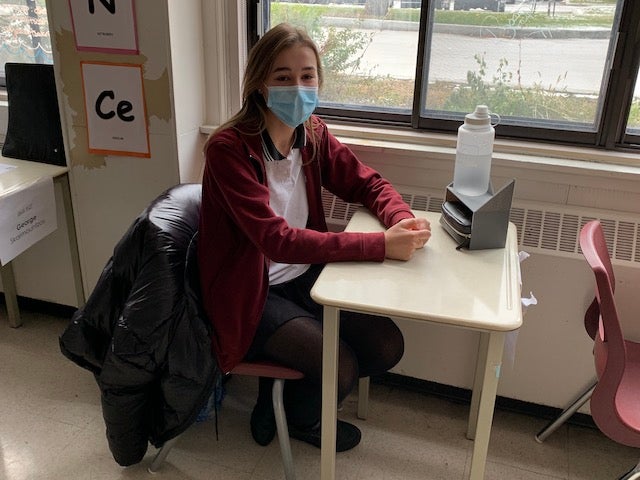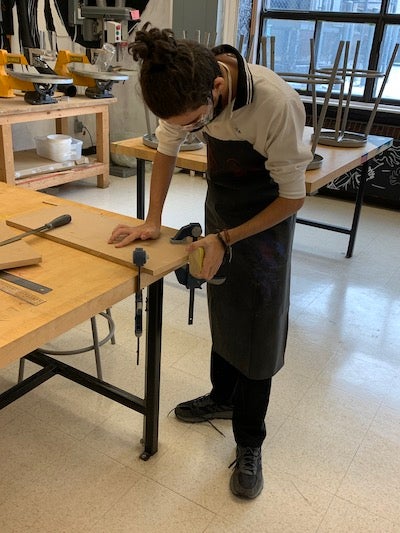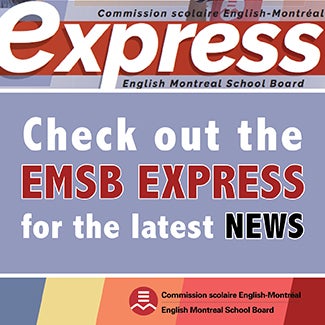STEAM students at Lauren Hill Academy well-equipped to tackle the school day during pandemic

Rachel Rolbin and Leo Papazogolu, Secondary III students at LaurenHill Academy in St. Laurent, have been faced with new protocols and guidelines previously foreign to them prior to the COVID-19 pandemic.
In addition to the wearing of masks and regular sanitization of their hands, Secondary III students now only attend school every other day. They also no longer roam from class to class throughout the school day, instead remaining in a single classroom at pre-assigned desks.
Rolbin, Papazogolu and their peers have made the most of this new reality, adding personalized touches to their learning space.
“I realized I had no room for my water bottle, my pencil case and my books on my desk,” said Rolbin. “I designed a mini-shelf for the corner of my desk to store my pencil case and water bottle.”
“One problem now is we don’t have lockers, so our books are all over the place,” said Papazogolu. “I thought, why not make a shelving unit to hold our books.”
These are just some of the approximately 60 individual projects LaurenHill’s Secondary III STEAM students are working on. STEAM, which stands for Science, Technology, Engineering, Arts and Mathematics, is an enriched-level program offering students the opportunity to apply what they are learning in the classroom to tackle real-world problems.
“The program teaches students extra skills that they wouldn’t necessarily have the opportunity to do if they weren’t in the program,” said Magy Dimitry, a science teacher at LaurenHill. “There’s a nice cohesion between the kids, because they have been together for three years. It’s almost like a family. Everybody knows each other.”
Dimitry says she first came up with the idea for the project as talk of a “bubble” learning system began to circulate.
“I figured since we’re all stuck in our bubbles right now, why not make the most of this situation and have the students create something that would be useful for their daily activities in class,” said Dimitry.
Ms. Dimitry has been working closely with the school’s English, math, history, and fellow science teachers, along with school librarian Julia Stark, throughout the duration of the project. Dimitry also sought the guidance of EMSB robotics consultant Sara Iatauro during the project’s early stages.
Students were given free rein to create any item they saw fit, as long as they met three distinct criteria. For one, projects must incorporate a triangle as part of its structure, with the students having just wrapped up an entire unit on triangles in their math class. Secondly, their design must not exceed dimensions of 10 x 10 centimetres, with a few exceptions. Finally, the item must serve a purpose and prove useful in the students’ day-to-day school life within the confines of the bubble.

After first conceiving of and designing the items by hand, students began putting their pieces together. The majority, including Rolbin, used an online 3-D printing software called Tinkercad in helping bring their ideas to fruition.
“Mine was the first to be printed,” said Rolbin. “I had used Tinkercad last year, but I didn’t really know what I was doing at first. Before too long, I had it figured out.”
Papazogolu, on the other hand, opted to build his project entirely by hand, using wood he has been cutting himself.
“For the past four-five weeks, during almost every lunch, I am cutting wood in the STEAM room,” said Papazogolu. “It’s something to look forward to. I enjoy building stuff so it helps me mentally.”
As the first-ever STEAM group at LaurenHill, the students have become accustomed to being pioneers and overcoming hurdles thrown their way. This project, too, has taught students vital skills extending beyond academics.
“I have learned to take my time and be patient,” said Papazogolu. “With this project, I need to have patience because, otherwise, I would have quit before I even started. I have also learned how to work together and help others with their individual projects, when I can.”
Students are currently putting the finishing touches on their projects, with many still waiting for their work to be printed on one of two 3-D printers located in the school library. From there, students will work on drawing a blueprint, with a subsequent cost breakdown and material analysis to follow using scientific and mathematical background research. The entire project is expected to be completed by mid-January.
Dimitry says it has all offered a nice distraction in what has proven to be a challenging start to the academic year.
“This project has been a highlight so far this year,” said Dimitry. “It has been really difficult on the morale and this makes our day fly by. For sure, COVID put a halt on a lot of things, but that is not stopping me. I won’t let this virus stop me. If the kids are really into things, it motivates me.”










